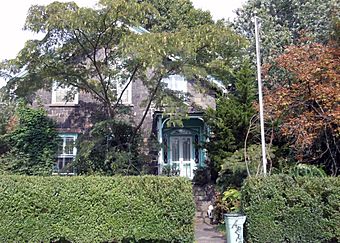Dr. Samuel MacKenzie Elliott House facts for kids
|
Dr. Samuel MacKenzie Elliott House
|
|

The house in September 2012
|
|
| Location | 69 Delafield Pl., Staten Island, New York |
|---|---|
| Area | less than one acre |
| Architect | Dr. Samuel, MacKenzie Elliott |
| Architectural style | Gothic Cottage |
| NRHP reference No. | 80002757 |
Quick facts for kids Significant dates |
|
| Added to NRHP | March 28, 1980 |
The Dr. Samuel MacKenzie Elliott House is a historic house located at 69 Delafield Place in West New Brighton, Staten Island, New York. This unique building has a fascinating past and a special architectural style.
Contents
About the Elliott House
This interesting house was built in 1840. It was one of 22 similar homes in the area. All these houses were designed and built by a Scottish eye doctor named Samuel Mackenzie Elliott. He was an oculist, which means he was a doctor who specialized in eyes. Dr. Elliott built these houses as investments.
Who Was Dr. Elliott?
Dr. Samuel MacKenzie Elliott was a very important person in his time. He had many famous clients, including John Jacob Astor, Peter Cooper, Henry Wadsworth Longfellow, and Horace Greeley. Because of his big influence, the area where he built these houses was even known as "Elliotville."
What Does the House Look Like?
The Dr. Samuel MacKenzie Elliott House is a two-and-a-half-story cottage. It's made from dark grey stone that was found locally. The house is built in the Gothic style. This style often includes pointed arches and steep roofs. The Elliott House has a gable roof with a small, pointed arch window under the back gable.
A Special House and Its History
Dr. Elliott was also known for being an abolitionist. This means he was against slavery and worked to end it. It is believed that this house, along with his own home, was a safe place for enslaved people escaping to freedom. These homes were part of the Underground Railroad, a secret network that helped people find their way to freedom.
The Dr. Samuel MacKenzie Elliott House is recognized as an important historical site. It was named a New York City Landmark in 1967. Later, on March 28, 1980, it was added to the National Register of Historic Places. This means it's officially recognized for its historical importance to the whole country.
 | Delilah Pierce |
 | Gordon Parks |
 | Augusta Savage |
 | Charles Ethan Porter |




